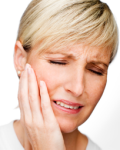TMJ
SANTA MONICA ACUPUNCTURE TREATMENT FOR TEMPOROMANDIBULAR JOINT DISORDER (TMJ)
What is TMJ?
 Temporomandibular Joint Disorder, most commonly known as TMJ, is named after the temporomandibular joints that connect the mandibile (lower jaw) to the skull. The two matching joints, one on each side of the head, in front of the ears allow your jaw to move up and down and from side to side. The problems occur when people have popping sounds in their jaw, cannot open their mouth completely, they have headaches toothaches, earaches and other facial pain. Some pain comes and goes, but for some people it is chronic. Millions of people are affected by TMJ every year.
Temporomandibular Joint Disorder, most commonly known as TMJ, is named after the temporomandibular joints that connect the mandibile (lower jaw) to the skull. The two matching joints, one on each side of the head, in front of the ears allow your jaw to move up and down and from side to side. The problems occur when people have popping sounds in their jaw, cannot open their mouth completely, they have headaches toothaches, earaches and other facial pain. Some pain comes and goes, but for some people it is chronic. Millions of people are affected by TMJ every year.
Experts estimate that nearly five percent of the population is currently suffering from TMJ disorder and looking for help. Approximately 20 percent at some point will suffer from this disorder in some or the other form.
3 Signs You May Have TMJ Disorder
TMJ Symptoms
Other symptoms of TMJ include headache, tension in the jaw, neck pain and ringing in the ears. Common triggers are stress or genetics but many people get TMJ after an injury or from an orthodontic treatment. Women look for treatment of TMJ symptoms more more than men.
STUDIES CONFIRM ACUPUNCTURE CAN TREAT TMJ
Numerous studies have found that acupuncture can relieve pain long term for TMJ problems. It is effective in relieving these symptoms by unlocking the affected muscles.
One review evaluated 15 studies, each with a reference group, randomization, blinding, appropriate statistics and sufficient follow-up. Of those 15 studies reviewed, 11 found acupuncture to be effective in treating TMJ. The study showed that 11 of the 15 studies showed acupuncture to be more effective than placebo or that it was able to produce better or similar results to an accepted treatment procedure. Therefore, the Review concluded that acupuncture . . . should be considered as a reasonable alternative or supplement to current dental practice in these areas (TMJ and analgesia).
A study conducted at the Sao Paulo University in Brasil discovered that after acupuncture treatments for three months, TMJ patients noted much reduced pain, increased bite strength and decreased electrical muscular overstimulation of the jaw muscles. The researchers observed that after treatment with acupuncture there was reduced jaw EMG activity at rest, protrusion, left and right laterality, and clenching; plus stronger maximum bite power.
TMJ TREATMENT WITH ACUPUNCTURE
In treating TMJ patients often exhibit deficient Qi in the liver channel and an over excess of Qi in the gallbladder channel. These meridians running down the sides of the body. When treating TMJ, the therapist will understand the source of the problem and build a treatment strategy. For example, if there I s neck pain or tension, Dr. Binder will release the neck muscles. Stress-induced TMJ means the work needs to be done on calming the mind and creating coping strategies. Relaxing techniques such as meditation, yoga or Qigong can help stress- triggered TMJ ailments. This will be discussed in the appointment.
Helpful supplements include joint enhancing and anti-inflammatory supplements such as Glucosamine, Cissus, Omega-3 supplements, Vitamin C. Calcium and Magnesium also work well.
In conclusion, we encourage you to consider acupuncture as your TMJ treatment option. Contact us

